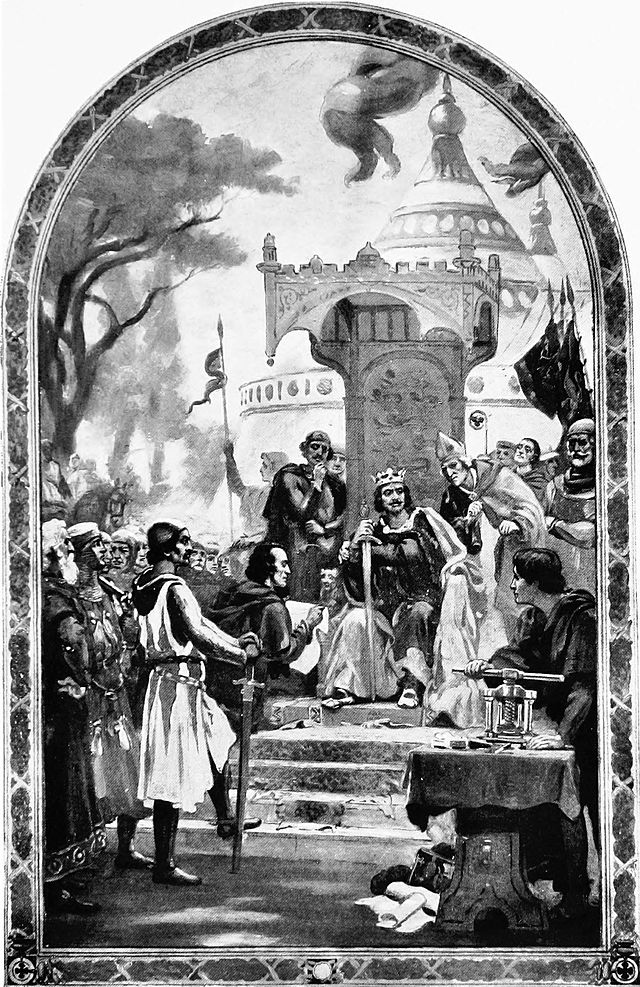Liberty Matters
The Risks involved in Disseminating Magna Carta
 Various of the more recent posts make me ponder the lessons taught by the board game "Risk". In the English and American versions of this game, players are instructed to "annex" or "conquer" a certain number of countries. Rebranded in Germany as "Risiko", the instructions turn matters on their head by insisting that players must "liberate" the requisite number of states. What to the victorious can seem "liberation", to the defeated often appears brute conquest. One person's defense of national security is another person's infringement of civil liberties. With specific reference to Magna Carta, the matter was put rather well, back in 1947, by K.W. Blaxter, a senior civil servant in the Colonial Office. In a departmental memorandum never intended for publication, Blaxter rejected recent proposals that 15 June be set aside each year as Magna Carta Day. There were grave risks, he suggested, in disseminating Magna Carta:
Various of the more recent posts make me ponder the lessons taught by the board game "Risk". In the English and American versions of this game, players are instructed to "annex" or "conquer" a certain number of countries. Rebranded in Germany as "Risiko", the instructions turn matters on their head by insisting that players must "liberate" the requisite number of states. What to the victorious can seem "liberation", to the defeated often appears brute conquest. One person's defense of national security is another person's infringement of civil liberties. With specific reference to Magna Carta, the matter was put rather well, back in 1947, by K.W. Blaxter, a senior civil servant in the Colonial Office. In a departmental memorandum never intended for publication, Blaxter rejected recent proposals that 15 June be set aside each year as Magna Carta Day. There were grave risks, he suggested, in disseminating Magna Carta:In some colonies where ill-disposed politicians are ever on the lookout for opportunities to misinterpret our good intentions, its celebration might well cause embarrassment, and in general there is a danger that the Colonial peoples might be led into an uncritical enthusiasm for a document which they had not read but which they presumed to contain guarantees of every so-called “right” they might be interested at the moment in claiming.[65]
This is an argument of stunning candour, reminiscent in many ways of the refusal of the worst of the sixteenth-century popes to sanction vernacular translations of the Christian Bible. Magna Carta, so it suggests, is too precious to those who enjoy its privileges to be made more widely available to those less fortunate. One person's good intentions are all too often another person's display of condescension or self-congratulation. In this eight-hundredth anniversary year, amidst the celebrations we must beware of hubris. In so far as the events at Runnymede gave rise to "liberty" they did so as idea rather than as historical reality. In the wrong hands, "liberty" can all too easily become a weapon in the arsenal of tyranny. Rousseau and Popper both knew this. It is one of the duties of historians, both of events and ideas, not only to commemorate but to police such distinctions.
Endnotes
[65.] K.W. Blaxter, Memorandum of 21 January 1947, The National Archives FO 371/61073, (London).
Copyright and Fair Use Statement
“Liberty Matters” is the copyright of Liberty Fund, Inc. This material is put on line to further the educational goals of Liberty Fund, Inc. These essays and responses may be quoted and otherwise used under “fair use” provisions for educational and academic purposes. To reprint these essays in course booklets requires the prior permission of Liberty Fund, Inc. Please contact oll@libertyfund.org if you have any questions.